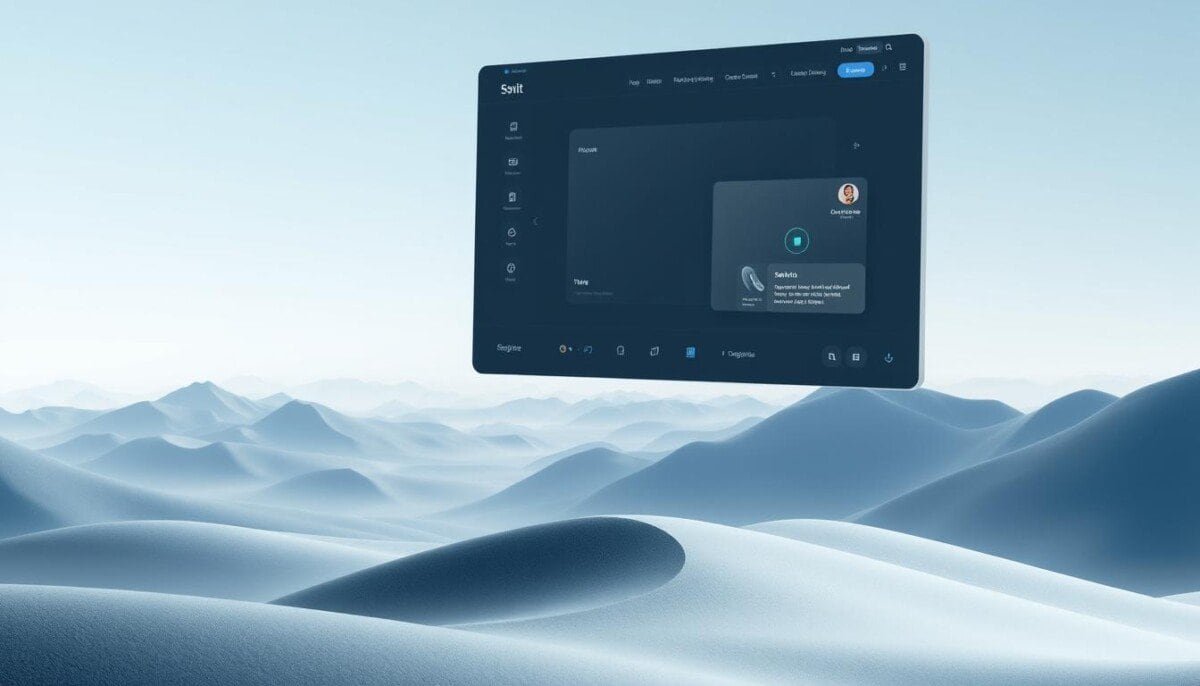The Best computer for hacking needs strong performance, lots of memory, and special features. They should run many operating systems and complex programs well. Look for a fast processor, at least 16GB of RAM (32GB is better for multitasking), and a solid-state drive (SSD) for quick data access.
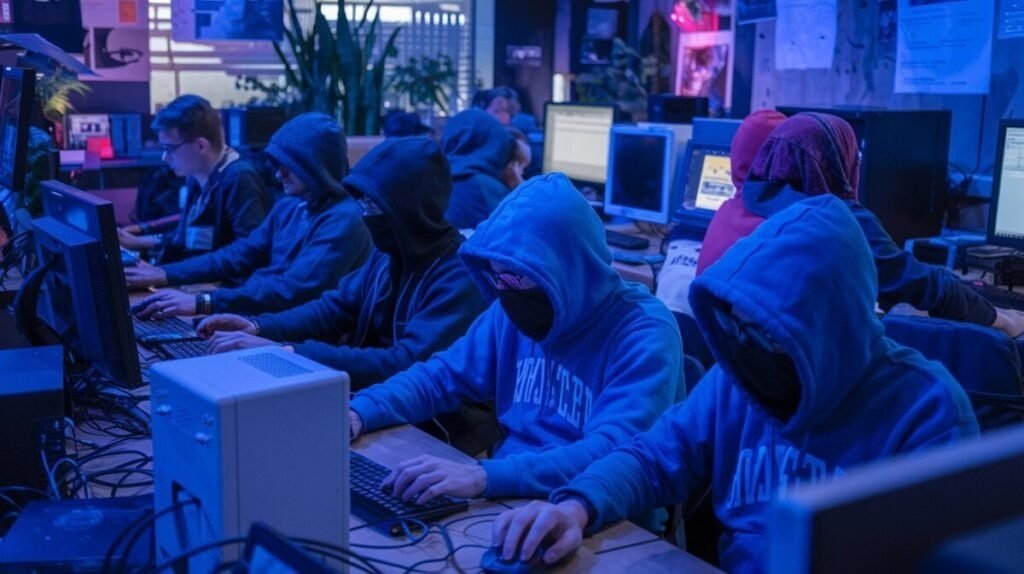
A powerful CPU, like the Intel i7, i9, or AMD Ryzen 7 and 9 series, is best for heavy tasks. This ensures efficient processing.
For hackers, Linux is key because many security tools work best on it. Kali Linux or Parrot OS are top choices. Laptops like the Lenovo ThinkPad X1 Carbon and Dell XPS series are great. They’re durable, portable, and work well with Linux.
For desktop fans, the Apple Mac Mini with M1 chip is efficient and can run Linux in virtual environments. Alienware and ASUS ROG desktops are also good. They let users upgrade parts as needed.
Being portable and having long battery life is crucial for remote work. The best hacking computers offer power, compatibility, and reliability. They help cybersecurity experts and ethical hackers with tasks like penetration testing and network security checks.
Macbook Pro M3 For Hacking
The MacBook Pro M3 is a powerful choice for hacking and cybersecurity tasks due to its advanced hardware and efficient architecture. Equipped with Apple’s new M3 chip, the MacBook Pro delivers faster processing, efficient energy use, and exceptional multitasking capabilities. For ethical hackers and security researchers, this model provides the speed and performance needed to handle intensive tasks like virtual machine (VM) management, network penetration testing, and real-time data analysis.
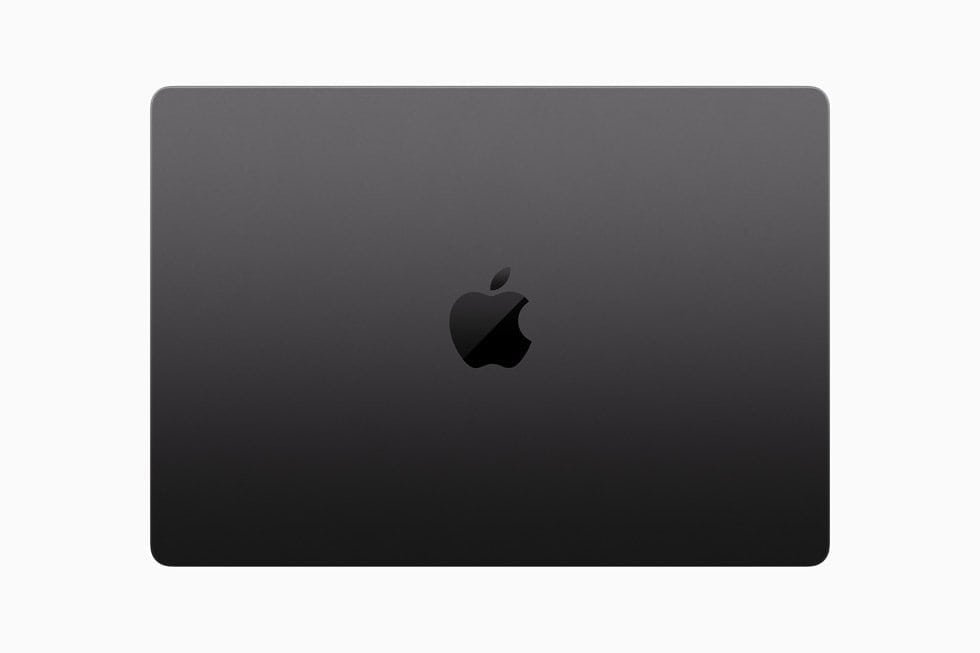
With up to 128GB of unified memory in higher-end configurations, the M3 MacBook Pro can smoothly run multiple VMs and security tools like Metasploit, Burp Suite, and Nmap. Its Metal-optimized graphics also support data visualization tools, making analysis smoother. Apple’s switch to ARM-based chips might limit compatibility with some x86-based hacking tools, but many essential applications have been optimized for macOS or are accessible through virtualization.

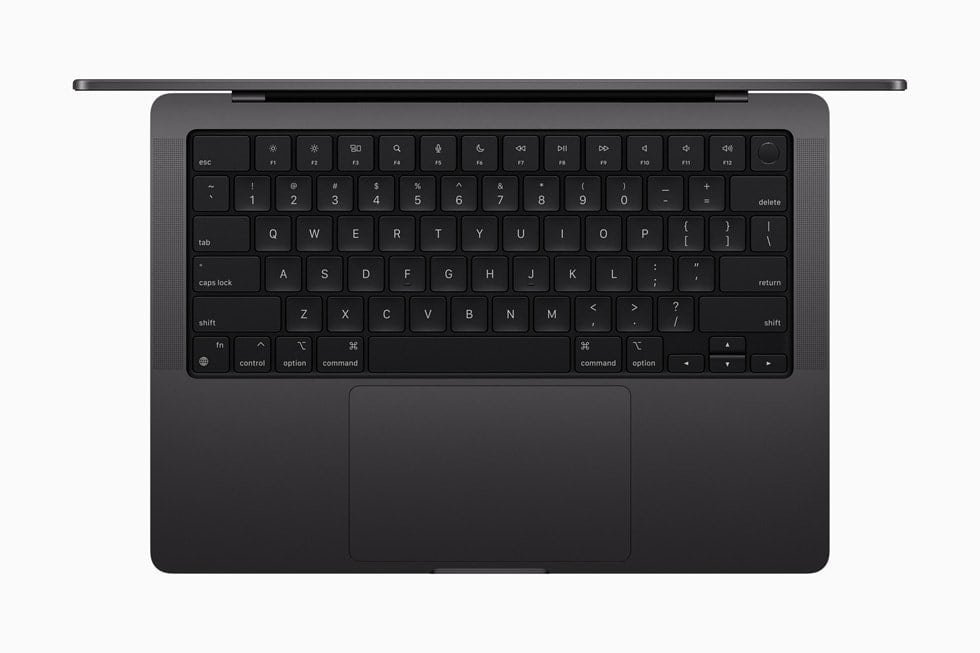
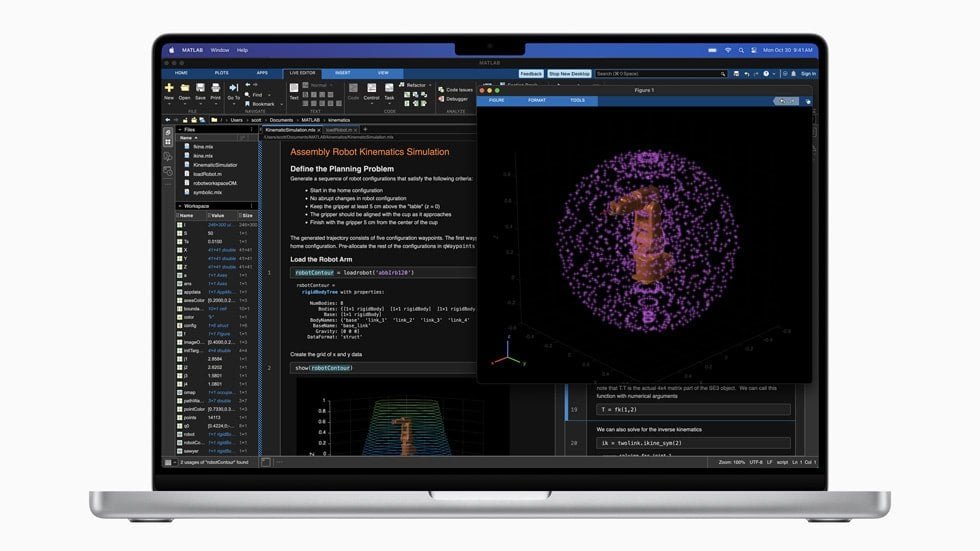
Battery life on the M3 MacBook Pro is a major advantage, allowing extended hacking sessions without frequent recharging. However, those needing Windows-only tools may require emulation or a secondary device. Overall, the MacBook Pro M3 offers high-speed processing and extended battery life, making it a solid tool for cybersecurity professionals and ethical hackers.
Dell XPS 15 for Hacking
The Dell XPS 15 is a strong choice for hacking and cybersecurity work due to its powerful Intel or AMD processors, high RAM options, and dedicated NVIDIA graphics. This laptop can run multiple virtual machines and security tools like Wireshark, Metasploit, and Kali Linux smoothly, essential for penetration testing and network analysis. Its 15-inch 4K display enhances data visibility, and its multiple ports support connecting external devices like USB boot drives for penetration testing.
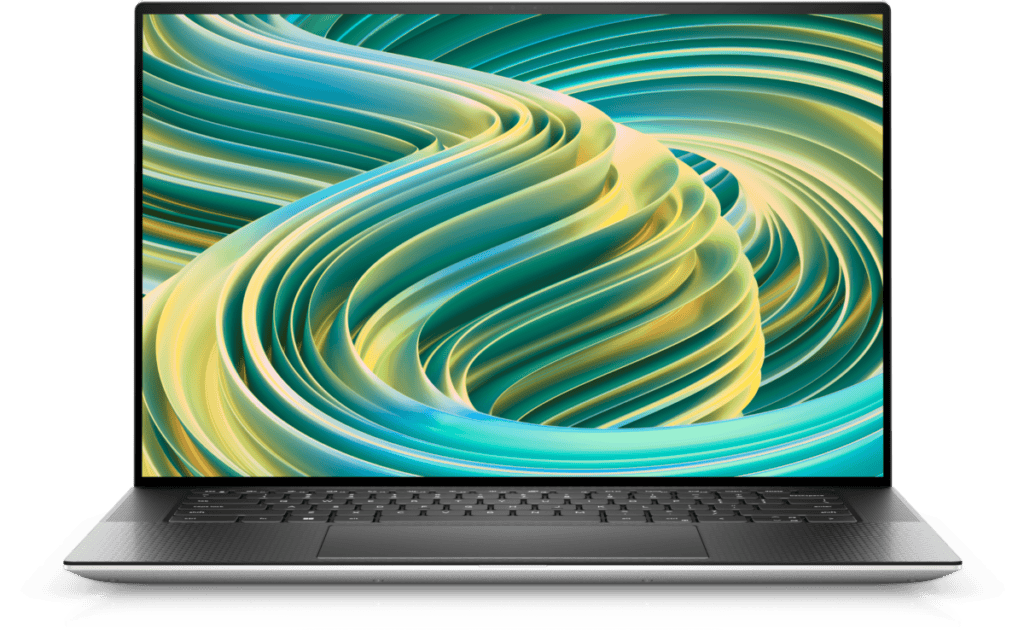
Additionally, the XPS 15’s customizable hardware, ample storage, and Windows/Linux compatibility provide flexibility, making it a reliable tool for security professionals and ethical hackers.
ASUS ROG Strix G16 for Hacking
The ASUS ROG Strix G16 is a gaming laptop well-suited for hacking and cybersecurity work due to its high-performance hardware and efficient cooling system. Powered by the latest Intel Core processors and NVIDIA GeForce RTX graphics, the ROG Strix G16 can handle demanding hacking tools and multitasking, including running multiple virtual machines (VMs) for penetration testing and network analysis. This hardware combination supports tools like Kali Linux, Metasploit, and Wireshark, allowing security professionals to efficiently conduct vulnerability assessments and analyze traffic.
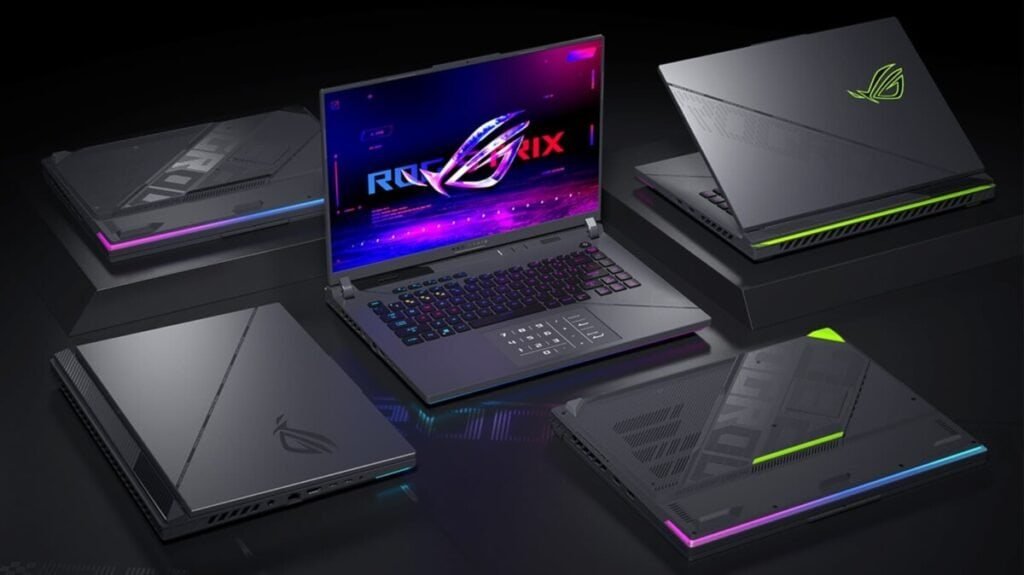
With up to 32GB of DDR5 RAM, the ASUS ROG Strix G16 provides the memory needed to run complex applications smoothly, even with multiple VMs operating simultaneously. The 16-inch display with a high refresh rate helps users see data and network traffic clearly, enhancing real-time monitoring and responsiveness. The laptop’s robust cooling system also supports extended sessions, ensuring stable performance during intensive tasks.
The ASUS ROG Strix G16 runs Windows out of the box, but it can support dual-booting with Linux, allowing hackers to easily switch between environments. Its customizable RGB keyboard adds flexibility for nighttime or low-light work. Overall, the ASUS ROG Strix G16 is a capable, versatile machine for cybersecurity and ethical hacking tasks.
Best Laptop for Hacking and Programming 2024
In 2024, the best laptops for hacking and programming combine high processing power, ample memory, and versatility to handle demanding tasks across both fields. The Apple MacBook Pro M3 series is a top choice for many developers and ethical hackers. With up to 128GB of unified memory and the advanced M3 chip, this laptop can run multiple virtual machines (VMs) and software like Kali Linux, Metasploit, and Xcode for programming with ease.
The macOS ecosystem offers stability, and its Unix-based system is compatible with many programming languages, while extended battery life supports long working hours without needing frequent recharging.
However, its ARM-based architecture may limit compatibility with certain x86 tools, although many popular tools are now optimized for macOS.
For those preferring Windows or Linux environments, the Dell XPS 15 and ASUS ROG Strix G16 are excellent alternatives. The Dell XPS 15 offers strong Intel or AMD processors, with configurations up to 64GB RAM, ideal for running code editors, Docker, and VMs for security testing.
Meanwhile, the ASUS ROG Strix G16, originally designed for gaming, brings high performance and efficient cooling, making it capable of handling hacking tools and heavy multitasking.
Its large display is helpful for code visibility and data analysis. Both laptops provide flexibility for dual-booting and customization, meeting the needs of programmers and ethical hackers who rely on powerful, adaptable hardware.
Razer Blade 18
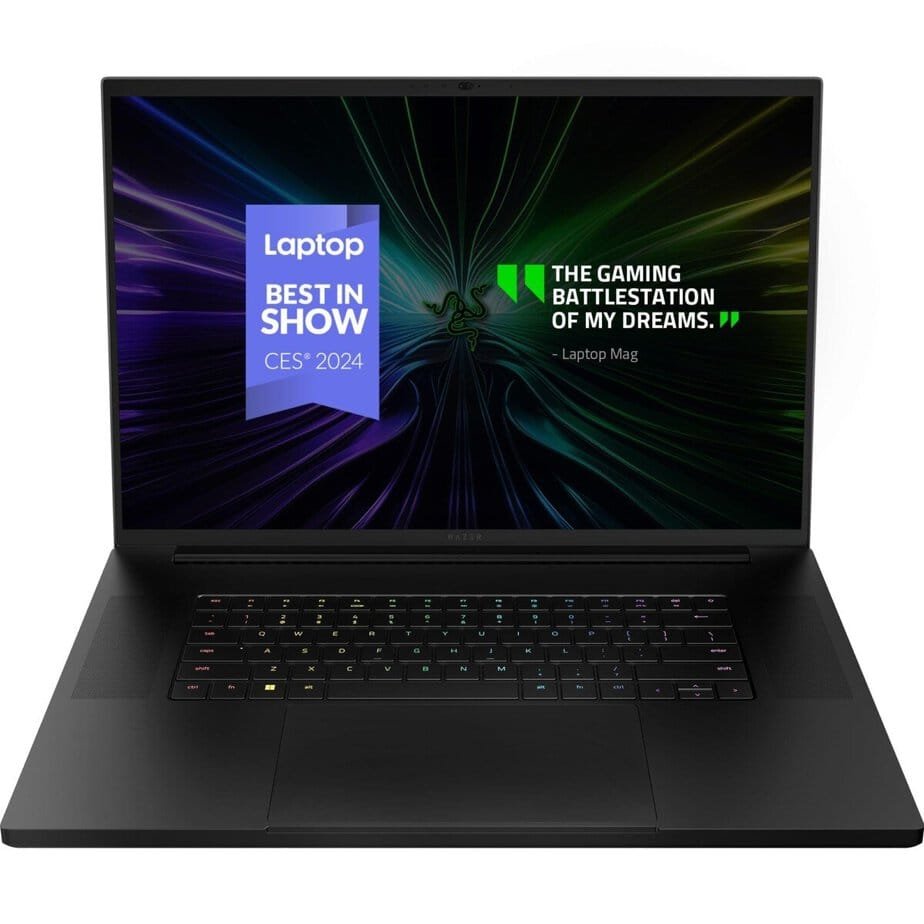
This laptop delivers outstanding performance for tasks like hacking and security testing.
Pros
- Exceptional 4K display with high refresh rate for clear visuals.
- Powerful hardware that can handle multiple virtual machines and tools.
- Impressive build quality with effective cooling.
Cons
- High price point may not be for everyone.
- May require some initial setup adjustments.
- Weighty design, which could be cumbersome for portability.
We’ve spent some time using the Razer Blade 18, and its first impression is striking, thanks to the vibrant 18″ 4K display. The resolution and refresh rate combine to provide sharp visuals that are beneficial when analyzing complex data or navigating multiple interfaces during security assessments. Color accuracy is top-notch, making this an excellent choice for both creative work and technical tasks.
In terms of performance, the Intel Core i9 processor paired with the NVIDIA GeForce RTX 4090 ensures we have more than enough power to run heavy software simultaneously. We found that handling multiple virtual machines or running resource-intensive applications was seamless. Plus, the advanced cooling system maintains lower temperatures even under substantial loads, which is crucial during lengthy hacking sessions when the laptop can get warm.
There are a couple of downsides to consider. First, the price is quite high, which may deter some potential buyers. Additionally, we encountered some tweaks needed for optimal charging with a Thunderbolt hub. While the weight is manageable, it does feel heavier than some competitors, which may be something to keep in mind if portability is your priority.
Overall, the Razer Blade 18 stands out as a robust option for anyone serious about hacking and tech tasks.
MSI Stealth 18 AI Studio
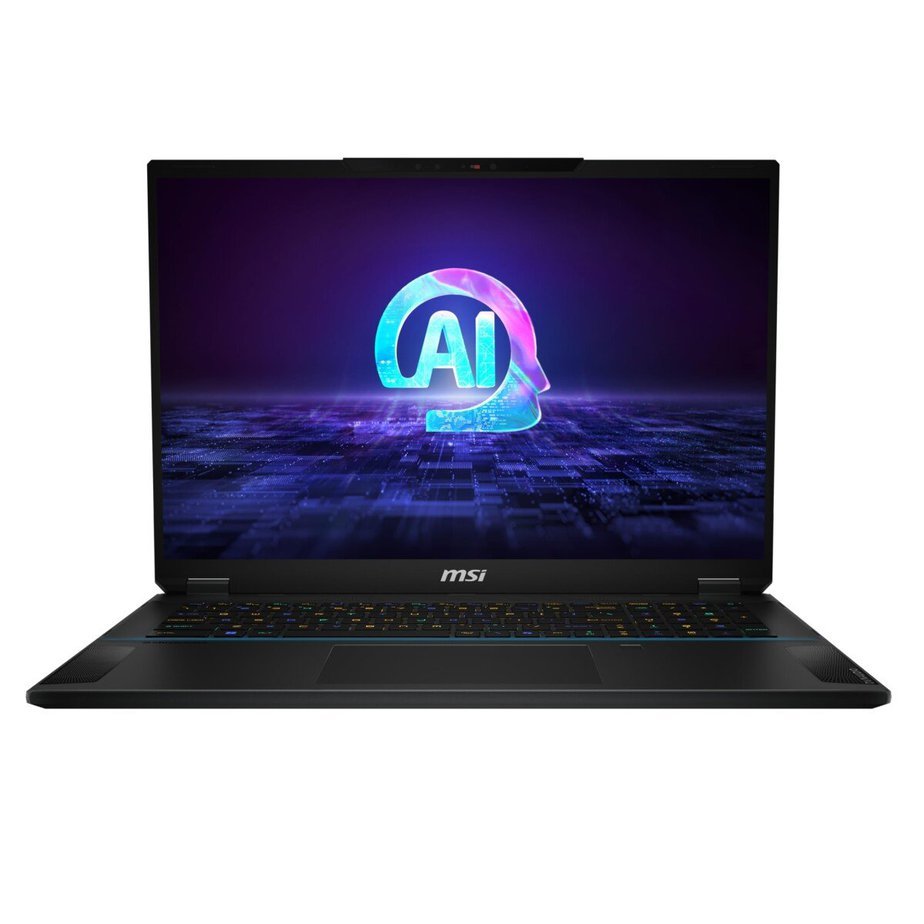
This laptop combines impressive power and portability, making it a solid choice for hacking enthusiasts.
Pros
- Exceptional processing power with the Intel Ultra 9.
- Stunning QHD+ display with high refresh rates.
- Lightweight yet robust design enhances mobility.
Cons
- Can become quite hot during extended sessions.
- Some users report initial boot issues.
- Battery life may not hold up during intense tasks.
Using the MSI Stealth 18 AI Studio was a great experience. We appreciated how effortlessly it handled demanding tasks without any lag, which is crucial when running various hacking tools. The QHD+ display really brought everything to life, displaying vivid graphics and intricate details. For those of us who value high refresh rates during gaming or multitasking, the 240Hz screen doesn’t disappoint.
The design struck us as both sleek and subtle. It’s not overly flashy, which makes it suitable for professional environments, yet it still exudes a modern touch. The 32GB of DDR5 RAM provides ample headroom for multitasking, allowing us to run multiple applications without any noticeable slowdown.
On the downside, we found that the laptop does generate significant heat, especially when under load. This could become uncomfortable during long hacking sessions. A few users mentioned having trouble powering it on at first. While we didn’t experience that directly, it’s worth noting that initial quality control may vary. Lastly, while the laptop features strong specs, the battery could drain faster than expected when running intensive processes.
Overall, the MSI Stealth 18 AI Studio is an excellent choice for anyone looking for a powerful and portable laptop suitable for hacking, provided you keep an eye on the heat levels and battery usage.
Alienware M18 R2 Gaming Laptop
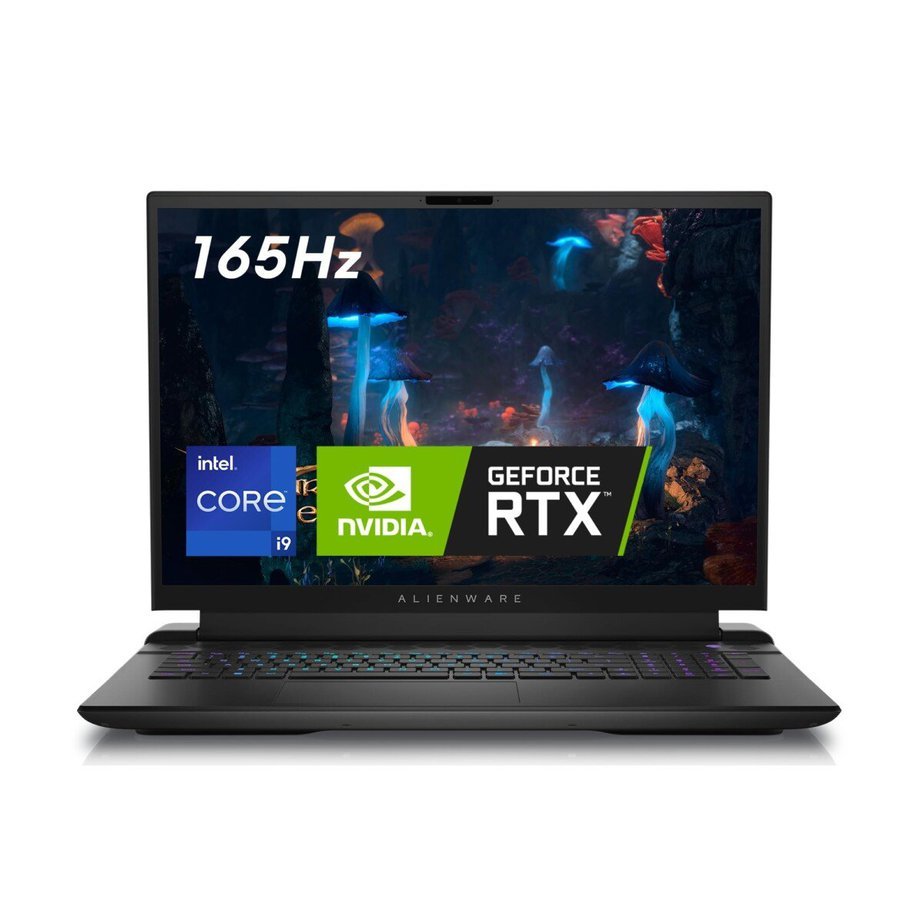
This laptop offers exceptional performance for hacking and other intensive tasks.
Pros
- Powerful Intel Core i9 processor and NVIDIA RTX 4080 graphics deliver strong performance.
- Advanced thermal management keeps the laptop cool during heavy use.
- High-resolution display with excellent color accuracy enhances the visual experience.
Cons
- Price may be on the higher side for some users.
- Hefty design can make it less portable.
- Bulky compared to other laptops, making it less convenient for traveling.
Using the Alienware M18 R2 has been a game-changer for us. The sheer power of the Intel Core i9 processor coupled with the NVIDIA RTX 4080 graphics ensures that we can tackle demanding applications with ease. Whether running multiple virtual machines or conducting penetration testing, we experienced smooth performance without noticeable lag.
The cooling system deserves a mention as well. It handles heat exceptionally well, meaning we didn’t have to worry about thermal throttling during long sessions. This is crucial when performing resource-intensive hacking tasks. The cooling system’s efficiency ensures that the device maintains peak performance even under heavy workloads, allowing for uninterrupted operations. This kind of reliability is especially important when diving into detailed analyses such as a HostGator vs Namecheap comparison, where multitasking and running multiple tools simultaneously can strain lesser systems. With this setup, users can focus on precision and productivity without being hindered by overheating concerns.
While it brings incredible performance, we found the size to be quite large. This design may not suit everyone, especially those looking for something lighter and more portable for on-the-go work. However, if you prioritize power over portability, the Alienware M18 R2 should be on your radar.
ASUS TUF Gaming Laptop
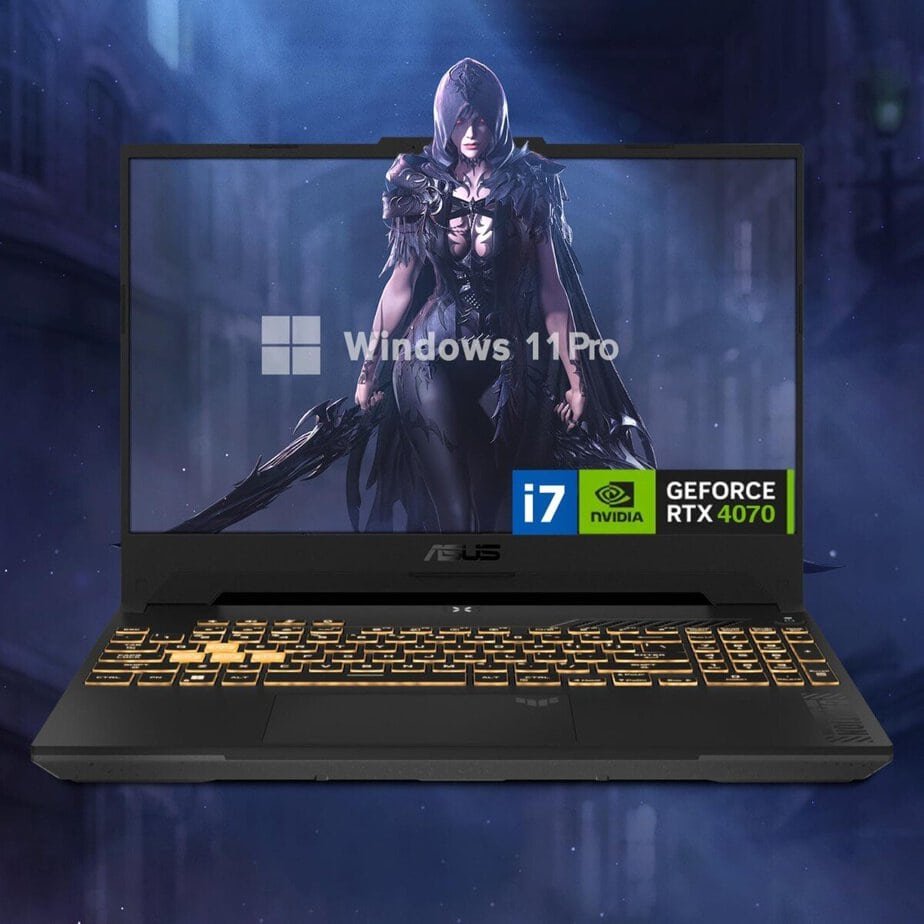
This laptop stands out for its power and performance, making it suitable for hacking tasks.
Pros
- Impressive processing power with a strong CPU and GPU combination.
- Ample RAM and storage allow for multitasking and handling large files.
- Solid build quality with an attractive design.
Cons
- Might be heavier compared to other models.
- Battery life could be better for intensive tasks.
- RGB keyboard may not appeal to everyone.
Using the ASUS TUF Gaming Laptop, we immediately appreciated the responsiveness brought by the Intel i7-13620H processor. The 10 cores and impressive clock speed ensure that even the most demanding applications run seamlessly. Whether it’s deploying virtual machines or running resource-intensive software, this laptop’s performance does not falter.
One feature that stands out is the 64GB RAM. This substantial memory is more than enough for handling multiple applications concurrently without any slowdown. We often found ourselves switching between programs fluidly, a crucial factor when multitasking during penetration tests or security assessments.
The 4TB SSD is a game changer, providing plenty of space for tools, scripts, and heavy data files. Quick boot times and fast data transfer will enhance productivity, allowing us to focus on tasks without delays. Despite being a gaming laptop, its specifications align perfectly with the needs of hacking and cybersecurity enthusiasts.
While the ASUS TUF excels in many areas, we did notice it can feel a bit cumbersome for on-the-go use. It’s not the lightest option out there, and while the battery life supports regular use, intensive tasks can drain it faster than we’d like.
In conclusion, for those seeking a dependable and powerful machine for hacking, this ASUS model offers a compelling blend of performance and features that will suit most tech-savvy users.
Lenovo Legion Pro 7i
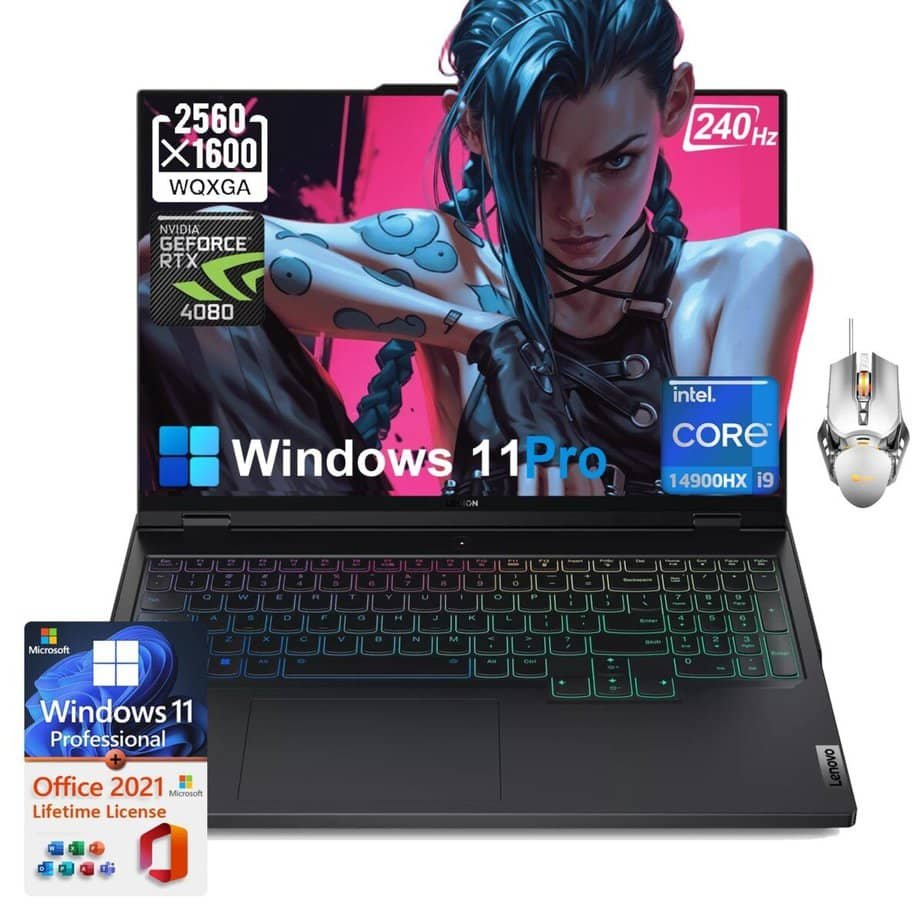
This laptop delivers impressive performance for anyone serious about hacking or advanced computing tasks.
Pros
- Exceptional processing speed with Intel’s i9-14900HX.
- High-quality display enhances detail and clarity.
- Ample storage and memory for multitasking and complex operations.
Cons
- Slightly heavier than traditional laptops.
- Price point may be high for casual users.
- Limited battery life during intensive use.
The Lenovo Legion Pro 7i has truly impressed us with its performance. The Intel i9 processor shines when running multiple virtual machines or heavy applications, making it ideal for anyone looking to delve deeply into ethical hacking or systems testing. The speed can handle demanding software without breaking a sweat.
We found the display to be beyond satisfactory, featuring a 16-inch high-resolution screen that provides vivid colors and sharp images. This is particularly useful when analyzing complex data or working with graphics-intensive tools. The laptop’s 240Hz refresh rate offers smooth visuals, beneficial for both gaming and virtual simulations.
Storage options are generous, with configurations up to 4TB SSD available. This allows us to maintain extensive databases or multiple OS installations efficiently. We appreciate the flexibility for upgrades as it ensures longevity in our gear. Although it has a robust build, its weight can be a concern for taking it on the go. Overall, the Lenovo Legion Pro 7i is an excellent pick for anyone who prioritizes power and functionality in their computing needs.
HP Omen Gaming Laptop
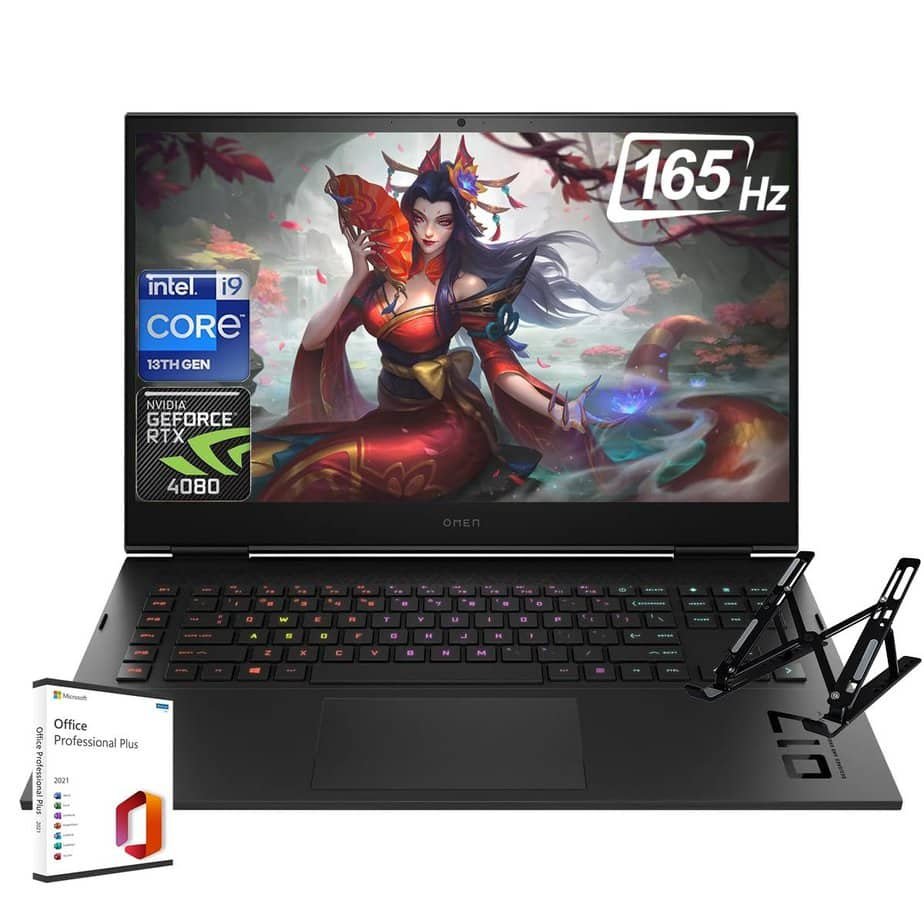
This laptop stands out for its advanced processing power and graphics capability, making it a solid option for hacking tasks.
Pros
- Exceptional multitasking with up to 64GB of DDR5 RAM.
- Stunning QHD display with a high refresh rate for smooth visuals.
- Powerful Intel i9 processor paired with NVIDIA GeForce RTX 4080 for demanding applications.
Cons
- Slightly heavier than some other gaming laptops.
- The battery life could be better, especially under heavy loads.
- Price point may be higher than basic options on the market.
When we first powered on the HP Omen Gaming Laptop, we immediately appreciated the sharpness of the 17.3-inch QHD display. The resolution makes it ideal for detailed coding environments and extensive data analysis. Tasks like scanning for vulnerabilities or running penetration tests became visually clearer and easier to manage.
The laptop is equipped with an Intel i9-13900HX processor, which means we can effortlessly run multiple applications side by side. The combination of 24 cores and 32 threads allows for extraordinary performance, especially when performing complex tasks like decoding or working with virtual machines. Gaming aside, those of us interested in cybersecurity will find this power beneficial for various hacking tools.
Storage is another significant advantage. With a 1TB SSD, we can store a large number of tools and files without worrying about running low on space. This aids in keeping our environment organized, essential for efficient hacking efforts.
In summary, the HP Omen Gaming Laptop combines high performance and excellent visuals, making it a practical choice for anyone in the hacking space.
ASUS ROG Zephyrus M16
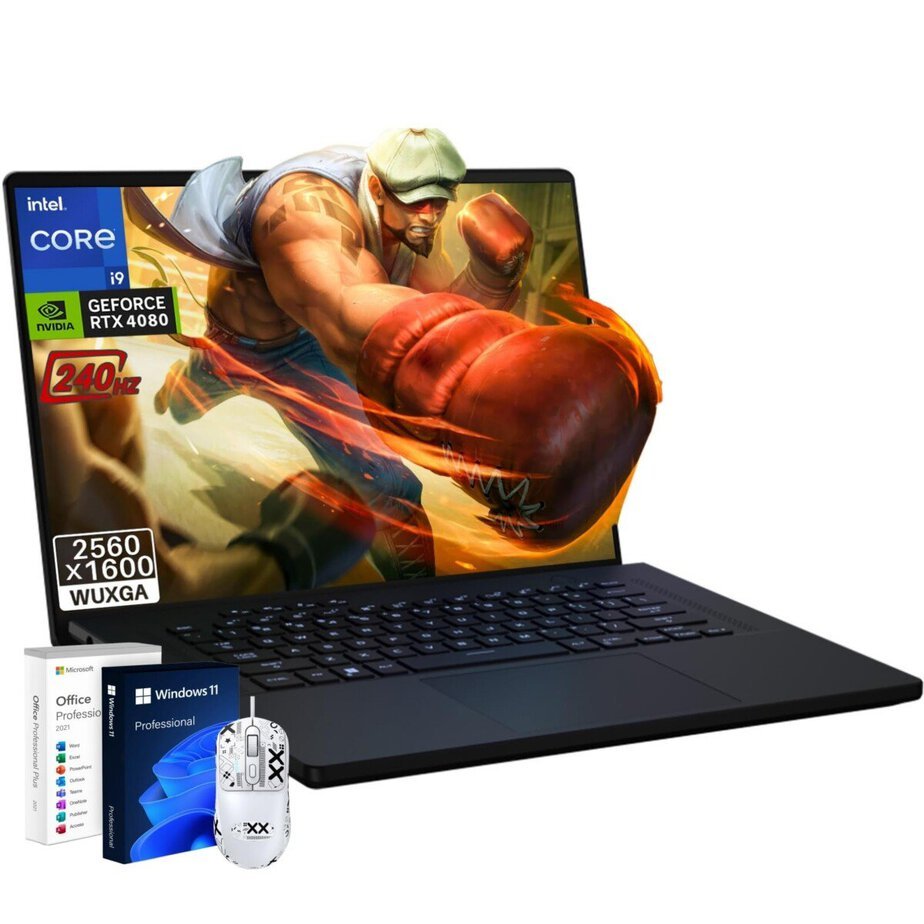
This laptop offers powerful performance suitable for hacking and intensive tasks.
Pros
- Exceptional processing power with the Intel i9-13900H.
- High refresh rate and resolution for clear visuals.
- Lightweight yet durable build makes it portable.
Cons
- Can get noisy under heavy load.
- Higher price point compared to some alternatives.
- Limited battery life during intensive use.
Recently, we had the chance to test out the ASUS ROG Zephyrus M16, and it really stands out. The combination of the Intel i9-13900H processor and NVIDIA GeForce RTX 4080 graphics makes it incredibly capable for both gaming and demanding tasks like hacking. When engaging in multiple virtual machines or running complex software, it performs smoothly without noticeable lag.
The display is another highlight; the 16-inch QHD screen with a 240Hz refresh rate provides vibrant visuals. Whether we were playing graphically intensive games or analyzing data for hacking purposes, the detail and clarity were impressive. The laptop’s cooling system works efficiently, though it can become a bit loud when pushed to its limits.
Carrying this laptop around is easy due to its relatively lightweight design and durable materials. For those who prioritize power in a portable package, this model fits the bill. It offers useful features like customizable RGB backlighting and excellent audio quality, enhancing our overall experience. The ASUS ROG Zephyrus M16 is a top contender for anyone serious about performance in both gaming and hacking.
Acer Nitro V 15
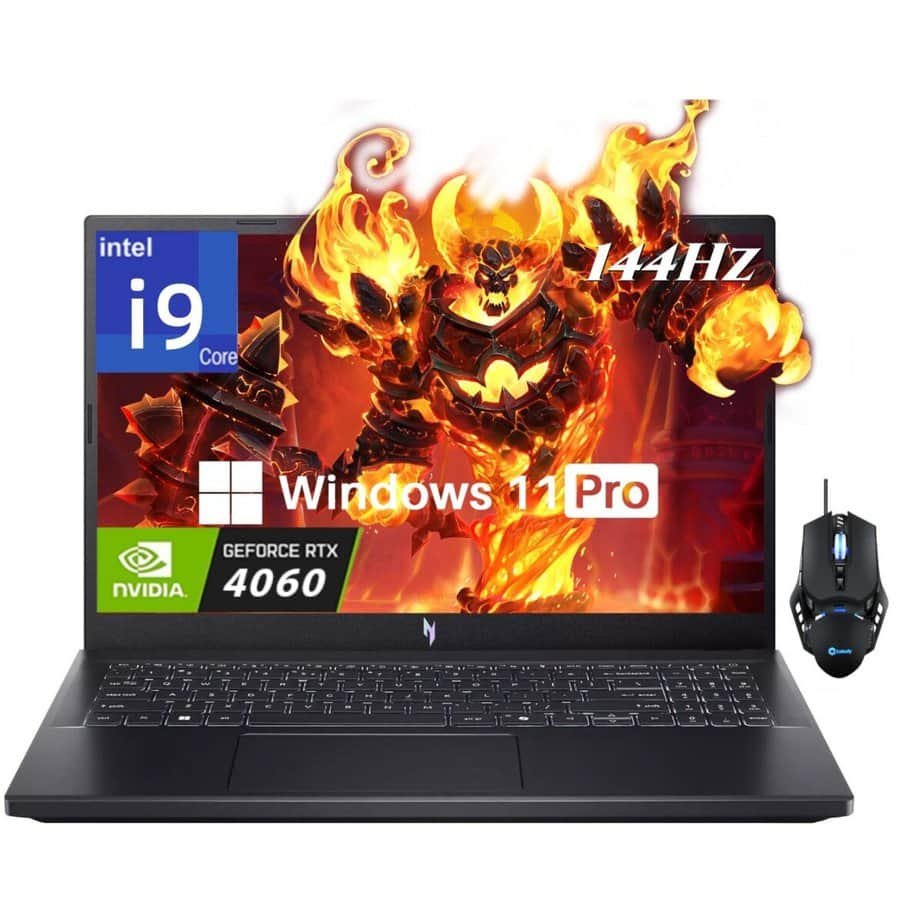
Great performance combined with sleek design makes this laptop a strong choice for hacking.
Pros
- Powerful Intel Core i9 processor for demanding tasks
- Ample RAM and storage for efficient multitasking
- High refresh rate display enhances visual clarity
Cons
- Can get warm under heavy loads
- Battery life may be limited during intense usage
- Pricey compared to other options
We recently put the Acer Nitro V 15 to the test and were impressed by its robust performance. The Intel Core i9 processor really stands out, providing the muscle needed for running various hacking tools and virtual machines simultaneously. It easily handles multitasking with 64 GB of RAM, which feels ample for any intensive projects we threw at it.
When it comes to storage, the 4 TB SSD ensures that we never ran out of space. This is particularly useful for storing large files and applications, something we often require in our line of work. The laptop’s dedicated NVIDIA GeForce RTX 4060 graphics also adds a layer of performance for any graphically intensive tasks that may arise.
While gaming capabilities are a bonus, we noticed the laptop tends to generate heat under heavy workloads, which could be a concern during longer hacking sessions. Additionally, the battery life could be extended, especially when using high-performance settings. Overall, the Acer Nitro V 15 is a solid investment for those looking to excel in hacking and gaming alike.
HP 14 cf2112wm review
The HP 14 CF2112WM is a budget-friendly laptop designed for basic tasks like web browsing, document editing, and media streaming. Featuring an Intel Pentium Gold 6405U processor, 4GB RAM, and 128GB SSD storage, it handles everyday tasks but may struggle with heavy multitasking or demanding applications. The 14-inch HD display provides decent visuals for the price, though it lacks the sharpness and color range of higher-end models. Lightweight and compact, it’s easy to carry, making it suitable for students or casual users. Battery life is average, lasting around 5-7 hours on moderate use. Overall, it’s a simple, affordable option.
Laptops Walmart Sale
Walmart’s laptop sales offer a variety of budget-friendly and high-performance options from brands like HP, Dell, Lenovo, and ASUS. Shoppers can find discounts on everyday-use laptops, gaming laptops, and models tailored for students and professionals.

Popular models, including the HP Pavilion and Lenovo IdeaPad, are often available at reduced prices, along with Chromebooks for basic tasks. Walmart also provides deals on high-end models, including Dell XPS and ASUS ROG series, ideal for gaming and demanding applications.
With options in-store and online, Walmart’s laptop sales cater to different budgets and needs, making technology more accessible and affordable.
Best Laptop for Pentesting
The best laptop for penetration testing, or pentesting, requires high processing power, ample memory, and compatibility with a variety of security tools and virtual environments.
The Dell XPS 15 is a popular choice due to its powerful Intel or AMD processors, up to 64GB of RAM, and excellent display. This configuration enables it to smoothly run multiple virtual machines (VMs) and tools like Kali Linux, Wireshark, and Metasploit, essential for conducting thorough network assessments and simulations.
Additionally, the Dell XPS 15’s solid build and long battery life make it a reliable option for security professionals who need portability without compromising on performance.
For those looking for even more processing power, the ASUS ROG Strix G16 offers impressive specifications, with Intel Core i9 processors and NVIDIA GeForce RTX graphics. Originally designed for gaming, this laptop’s high-end hardware supports demanding pentesting tasks, such as real-time data analysis and traffic monitoring.
The large 16-inch display and high refresh rate provide an added advantage when viewing complex data or analyzing network traffic.
Moreover, the laptop’s advanced cooling system allows for extended use without overheating, making it suitable for long pentesting sessions or multitasking across various applications.
Another excellent option is the Apple MacBook Pro M3, especially for users in need of a Unix-based environment.
With up to 128GB of unified memory and the efficiency of the M3 chip, the MacBook Pro can handle intensive tasks, including running security tools, VMs, and development environments simultaneously. Its extended battery life is ideal for fieldwork, allowing pentesters to conduct assessments without frequently recharging.
Although some x86-based tools may require workarounds on macOS, many popular pentesting applications are now compatible, making the MacBook Pro M3 a powerful and versatile choice for cybersecurity professionals.
Best Laptop for osint
The best laptop for Open-Source Intelligence (OSINT) gathering combines powerful processing, ample memory, and portability for data-intensive tasks. The Dell XPS 13 is a strong choice, offering a high-resolution display for detailed analysis and up to 32GB of RAM, which supports multiple browser tabs, VMs, and OSINT tools like Maltego, Recon-ng, and Spiderfoot.
For a Unix-based alternative, the Apple MacBook Pro M2 offers smooth multitasking, long battery life, and high performance, essential for long research sessions. Both laptops are lightweight, making them ideal for professionals needing a portable yet powerful device for investigative and analytical OSINT tasks.
FAQ
How important is portability in a laptop for hacking?
Portability is key for ethical hackers who work on the go. A lightweight laptop makes it easier to bring your skills to client sites, conferences, or remote work locations. Good battery life is also essential, allowing extended work without constantly needing to recharge.
What’s the best laptop for hacking and cybersecurity in 2024?
The Lenovo ThinkPad series is a top choice for hacking and cybersecurity. Known for reliability and strong security features, it’s well-suited for ethical hacking tasks. Paired with Kali Linux, the ThinkPad is powerful for penetration testing and secure network analysis.
Is a MacBook Pro good for hacking and cybersecurity?
Yes, the MacBook Pro is a solid option with its M2 chip and long battery life, providing excellent performance for cybersecurity. However, familiarity with macOS and the ability to dual-boot Linux is helpful for using a broader range of hacking tools.
Can a Dell XPS handle ethical hacking and cybersecurity?
Definitely! The Dell XPS has powerful Intel processors and sufficient RAM for running multiple security tools. Its sleek design combines style with functionality, making it a reliable and efficient choice for penetration testing and cybersecurity tasks.
Why is Kali Linux essential for hackers and cybersecurity professionals?
Kali Linux is a popular OS among hackers and cybersecurity professionals due to its extensive range of pre-installed tools for hacking, penetration testing, and network analysis, all designed for effective security assessments.


